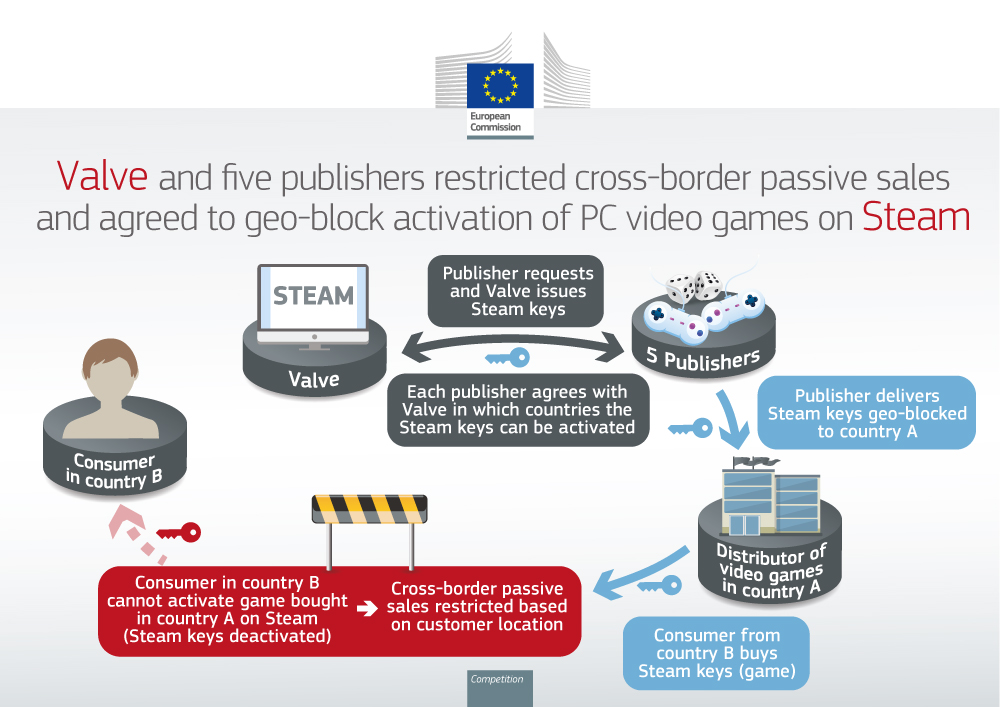The European Commission has fined Valve, owner of the online PC gaming platform “Steam”, and the five publishers Bandai Namco, Capcom, Focus Home, Koch Media and ZeniMax € 7.8 million for breaching EU antitrust rules. Valve and the publishers restricted cross-border sales of certain PC video games on the basis of the geographical location of users within the European Economic Area (‘EEA’), entering into, the so called “geo-blocking” practices. The fines for the publishers, totalling over €6 million, were reduced due to the companies’ cooperation with the Commission. Valve chose not to cooperate with the Commission and was fined over €1.6 million.
Executive Vice-President Margrethe Vestager, in charge of competition policy, said: “More than 50% of all Europeans play video games. The videogame industry in Europe is thriving and it is now worth over € 17 billion. Today’s sanctions against the “geo-blocking” practices of Valve and five PC video game publishers serve as a reminder that under EU competition law, companies are prohibited from contractually restricting cross-border sales. Such practices deprive European consumers of the benefits of the EU Digital Single Market and of the opportunity to shop around for the most suitable offer in the EU”.
Steam is one of the world’s largest online PC video gaming platforms offering more than 35 000 games worldwide. It allows users, upon authentication, to directly download or stream PC video games. It also allows users who buy PC video games outside Steam, such as in brick-and-mortar shops (e.g. on DVDs) or digitally through downloads from third-party websites, to activate and play video games on Steam.
Valve provides to video game publishers the technical means to activate and play games on Steam, including those games bought outside Steam, through the so-called, “Steam activation keys”. Publishers include those keys in their PC video games for user authentication/activation. The PC video games are then sold by third party distributors across the EEA. Valve also offers to the publishers a territory control function, which enables the setting up of geographical restrictions upon activation. The combination of Steam activation keys with the territory control function enables the “geo-blocking” of PC video games based on the geographical location of the user.
The video game publishers granted Valve a non-exclusive licence to exploit specified PC video games on a worldwide basis, including the entirety of the EEA. In turn, the publishers obtained from Valve a licence for the use of Steam activation keys for distribution of those PC video games outside Steam. The publishers requested Valve to set up geographical restrictions and to provide geo-blocked Steam activation keys. The publishers provided those keys to their distributors for sale and distribution of the PC video games in the Member States concerned. As a result, users located outside a designated Member State were prevented from activating a given PC video game with Steam activation keys.
Geo-blocking practices
The Commission found that by bilaterally agreeing to geo-block certain PC video games from outside a specific territory, Valve and each publisher partitioned the EEA market in violation of EU antitrust rules. In particular, today’s Decisions conclude that Valve and the publishers engaged in the following geo-blocking practices:
- Bilateral agreements and/or concerted practices between Valve and each of the five PC video game publisher implemented by means of geo-blocked Steam activation keys which prevented the activation of certain of these publishers’ PC video games outside Czechia, Poland, Hungary, Romania, Slovakia, Estonia, Latvia and Lithuania, in response to unsolicited consumer requests (so-called “passive sales”). These lasted between one and five years and were implemented, depending on the cases, between September 2010 and October 2015.
- Geo-blocking practices in the form of licensing and distribution agreements concluded bilaterally between four out of the five PC video game publishers (i.e. Bandai, Focus Home, Koch Media and ZeniMax) and some of their respective PC video games distributors in the EEA (other than Valve), containing clauses which restricted cross-border (passive) sales of the affected PC video games within the EEA, including the above-mentioned Central and Eastern European countries. These lasted generally longer, i.e. between three and 11 years and were implemented, depending on each bilateral relationship, between March 2007 and November 2018.
The geo-blocking practices concerned around 100 PC video games of different genres, including sports, simulation and action games. They prevented consumers from activating and playing PC video games sold by the publishers’ distributors either on physical media, such as DVDs, or through downloads. These business practices therefore denied European consumers the benefits of the EU’s Digital Single Market to shop around between Member States to find the most suitable offer.
The Commission has concluded that the illegal practices of Valve and the five publishers partitioned the EEA market in violation of EU antitrust rules.



